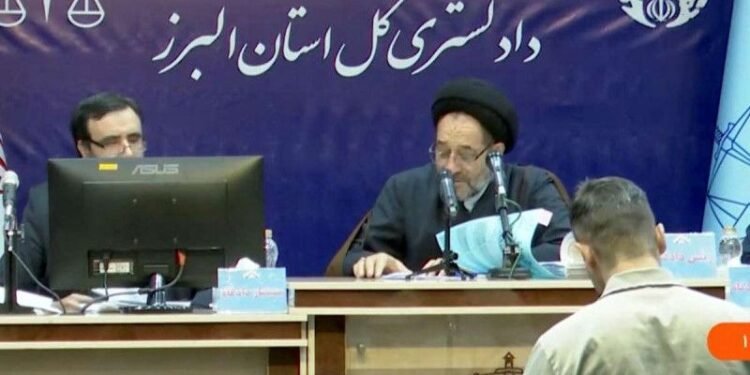Iranian justice announced on Saturday the execution by hanging of two men convicted of killing a paramilitary in November during protests sparked by the death of Mahsa Amini, a decision that sparked international outrage. These deaths bring the number of executed to four since the start of the protest movement in Iran in mid-September.
Mizan Online, the information agency of the judiciary reported that “Mohammad Mahdi Karami and Seyyed Mohammad Hosseini, the main perpetrators of the crime that led to the martyrdom of Ruhollah Ajamian, were hanged on the morning” of Saturday.
The two men were accused of killing this member of the Basij paramilitary militia, linked to the Revolutionary Guards, on November 3 in Karaj, a city west of Tehran. The trial court sentenced them to death on 4 December. The verdict was confirmed on January 3 by the Supreme Court of Iran, a process described as “expedited” by the NGOs defending human rights.
The UN High Commissioner for Human Rights on Saturday denounced trials “based on extorted confessions.” “It is shocking that Iran continues to execute protesters, despite international outrage,” the agency said on Twitter.
The European Union was “dismayed” by the executions, Nabila Massrali, spokesman for the head of community diplomacy, the Spanish Josep Borrel, said in a statement this Saturday.
The EU “once again calls on the Iranian authorities to immediately end the highly condemnable practice of issuing and carrying out death sentences against protesters,” the spokesperson said.
France called the executions “disgusting” and the Netherlands announced the summons of the Iranian ambassador. For her part, the German Foreign Minister, Annalena Baerbock, said the executions strengthen Berlin’s will to “increase pressure on Tehran within the EU.”
The US State Department condemned “in the strongest terms” what it called the “mock trials and execution” of two men in Iran for killing a member of paramilitary forces during protests over the death of the young Mahsa Amini during her confinement.
“These executions are a key component of the (Tehran’s) regime’s effort to suppress protests. We continue to work with allies to seek accountability for Iran’s brutal crackdown,” State Department spokesman Ned Price said in his statement. Twitter network account.
Desperation of a Father
Since the beginning of the demonstrations, the justice system has sentenced 14 people linked to these protests to death, according to a count based on official information. Of these, four have been executed, another two received a confirmation of the sentence by the Supreme Court, six await a new process and two can appeal the decision.
Activists in the country say that another dozen people face charges that can carry the death penalty. The Islamic Republic has been rocked by a protest movement following the death on September 16 of Mahsa Amini, a 22-year-old Kurdish woman who had been arrested for allegedly violating the dress code, which includes wearing a headscarf.
Iran calls the mobilization “riots” and says they are fueled by foreign countries and opposition groups, saying hundreds of people have been killed in the clashes, including members of the security forces.
The executions on Saturday come despite a campaign by NGOs calling on Tehran to pardon Mohammad Mahdi Karami and Seyed Mohammad Hosseini. Amnesty International denounced an “unfair” process. In mid-December, Mohammad Mahdi’s father, Mashallah Karami, posted a video on social media imploring the authorities to quash the death sentence against his son.
The lawyer, Mohammad Aghasi, wrote on Twitter that Karami was unable to meet with his family before his execution. According to the group Iran Human Rights (IHR), based in Norway, Karami was 22 years old and, according to NGOs, Hosseini, 39 years old.
Accused of “Sham Trial”
IHR director Mahmood Amiry-Moghaddam claimed the two had been “subjected to torture and sentenced after a mock trial”. Tehran has already been subject to a series of international sanctions in reaction to the crackdown on protests. Iranian Supreme Leader Ayatollah Ali Khamenei announced Saturday that he has appointed Ahmad-Reza Radan as the new head of the national police.
In 2010, the US Treasury Department blacklisted Ahmad-Reza Radan for violating human rights, following the controversial re-election of ultra-conservative President Mahmud Ahmadinejad, which led to major protests suppressed by power. That same year, he was sanctioned by the European Union.
This article is originally published on cadenanoticias.com




